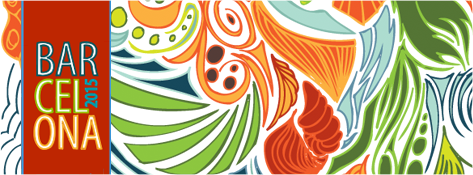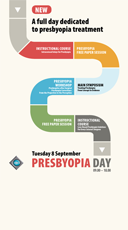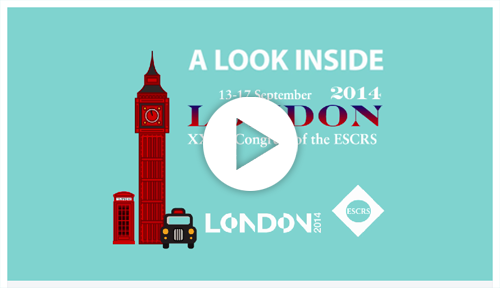Posters
(results will display both Free Papers & Poster)
Clinical results of a bi-toric, trifocal multifocal intraocular lens
Poster Details
First Author: F.Kretz GERMANY
Co Author(s): D. Breyer H. Kaymak M. Gerl M. Mueller R. Gerl G. Auffarth
Abstract Details
Purpose:
Clinical evaluation of near, intermediate and distance visual acuity with a new bi-toric, trifocal multifocal intraocular lens for the correction of corneal astigmatism in presbyopic cataract surgery.
Setting:
International Vision Correction Research Network , Germany(IVCRC.net)
Methods:
In a prospective study we evaluated the functional outcome of 56 eyes of 28 patients implanted with a bi-toric, trifocal multifocal intraocular lens (AT LISA toric multifocal MIOL, Carl Zeiss Meditech, Germany) 3 month after surgery. Examinations included UDVA (ETDRS 4m), UIVA (ETDRS 80cm), UNVA (ETDRS 40cm) as well as CDVA, DCIVA and DCNVA [logMAR] in the same distances. Additionally we performed visual acuity testing’s in set and individual distances (uncorrected and distance corrected) with the use of the Salzburg Reading Desk.
Results:
Median binocular UDVA was 0.02, UIVA was 0.04 and UNVA 0.10 compared to a CDVA of -0.04, a DCIVA of -0.10 and a DCNVA of -0.10 [logMAR]. Regarding the Salzburg Reading Desk evaluation a binocular, objective UNVA (39.4 cm) of 0.11 similar to a subjective UNVA (38.9cm) could be found. For the intermediate range the objective UIVA was 0.09 (80.0cm) compared to a subjective UIVA of 0.03 (78.2cm).
Conclusions:
The bi-toric, trifocal multifocal intraocular lens offers a high amount of spectacle independance for daily tasks. Small postsurgical refractive errors can be balanced by the wide range of focus of those types of lense.
Financial Disclosure:
One or more of the authors receives consulting fees, retainer, or contract payments from a company producing, developing or supplying the product or procedure presented, One or more of the authors travel has been funded, fully or partially, by a competing company, One or more of the authors travel has been funded, fully or partially, by a company producing, developing or supplying the product or procedure presented, One or more of the authors research is funded, fully or partially, by a competing company, One or more of the authors research is funded, fully or partially, by a company producing, developing or supplying the product or procedure presented, One or more of the authors receives consulting fees, retainer, or contract payments from a competing company





